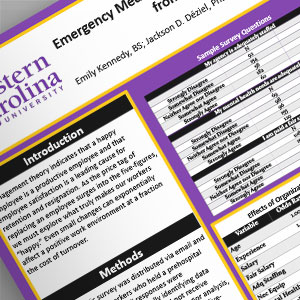ABSTRACTS
Emergency Medical Services Worker Satisfaction: Results from a National SurveyAuthor: Emily Kennedy | Paramedic | Onslow County EMS Associate Authors: Deziel, Jackson, D, PhD, MPA, NRP | Raming, Brian, PhD, MBA, NRP
Introduction Management theory indicates that a happy employee is a productive employee and that employee satisfaction is a leading cause for retention and resignation. As the price tag of replacing an employee surges into the five-figures, we must explore what truly makes our workers “happy.” Even small changes can exponentially affect a positive work environment at a fraction the cost of turnover. Methods An electronic survey was distributed via email and social media to workers who held a prehospital provider credential. All responses were anonymous and no personally identifying data were collected. Respondents did not receive compensation for their participation. For analysis, Likert-type questions were used with the five-point scale. For tests of inference, the authors employed Chi-squared tests, logistic regression, and ordered logistic regression. Results The survey distribution yielded 703 responses. A majority of participants reported that they were happy with their current job (79.4%) and were secure in their employment (72%). As to equipment and staffing, 72% felt as though they had the necessary equipment to perform their duties, but 44% deemed their organization as adequately staffed. A plurality (47.6%) believed that they were not paid a fair salary, but a majority (59.7%) indicated that they received adequate vacation time/leave. When rating their work environment, a quarter of participants (25.2%) stated that they had been bullied at work and 37.9% were uncomfortable requesting sick-time/leave. Participants were 2.3-times more likely to report being happy with their job if they agreed that their organization was adequately staffed, and 2-times more likely to be happy if they agreed that they had adequate equipment. Additionally, respondents were 89% more likely to report happiness if they felt their employer was meeting their mental health needs. Respondent salary was not associated with job satisfaction. Conclusion Most respondents were happy in their current job. Adequate equipment, staffing, and mental health resources were the largest drivers of satisfaction. Although nearly half of participants believed that they were not paid a fair salary, it did not affect their overall satisfaction. The results of this survey indicate that managers should focus on a suite of well-rounded employee resources.
|

